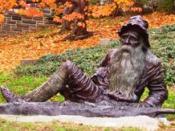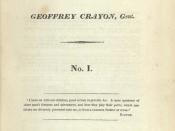Some of the best well-known works of American literature have a theme about nature and how magnificent, beautiful and astonishing nature is. Out of all the possible literary works that have a theme about nature there's three in particular that are going to be described in this essay. These three works are "A Description of New England," by John Smith, "Rip Van Winkle," by Washington Irving, and "Thanatopsis," by William Cullen Bryant. Each has a very good way of conveying nature and how stunning it is to them.
In "A Description of New England," John Smith talks about how amazing the nature is in the new world. He did this to persuade people to come to the new world so they and he could profit from the abundance of nature that he sees while traveling. He talks about how wondrous nature is by saying, "From Penobscot (a river and bay on the Maine coast) to Sagadahoc (another river in Maine now called the Kennebec River) this coast is all mountainous and isles of huge rocks but overgrown with all sorts of excellent good woods for building houses, boats, barks, or ships, [and] with an incredible abundance of most sorts of fish, much fowl, and sundry sorts of good fruits for man's use."
(Smith 57) He hopes that people will come and use the abundances of the nature he sees to get rich by building their own houses, shops, towns and to live a good life.
Then in "Rip Van Winkle," Washington Irving gives an illustrious description of the Catskills Mountains in New York. He says, "Whoever has made a voyage up the Hudson must remember the Kaatskill mountains. They are a dismembered branch of the great Appalachian family, and are seen away to the west of the river,


